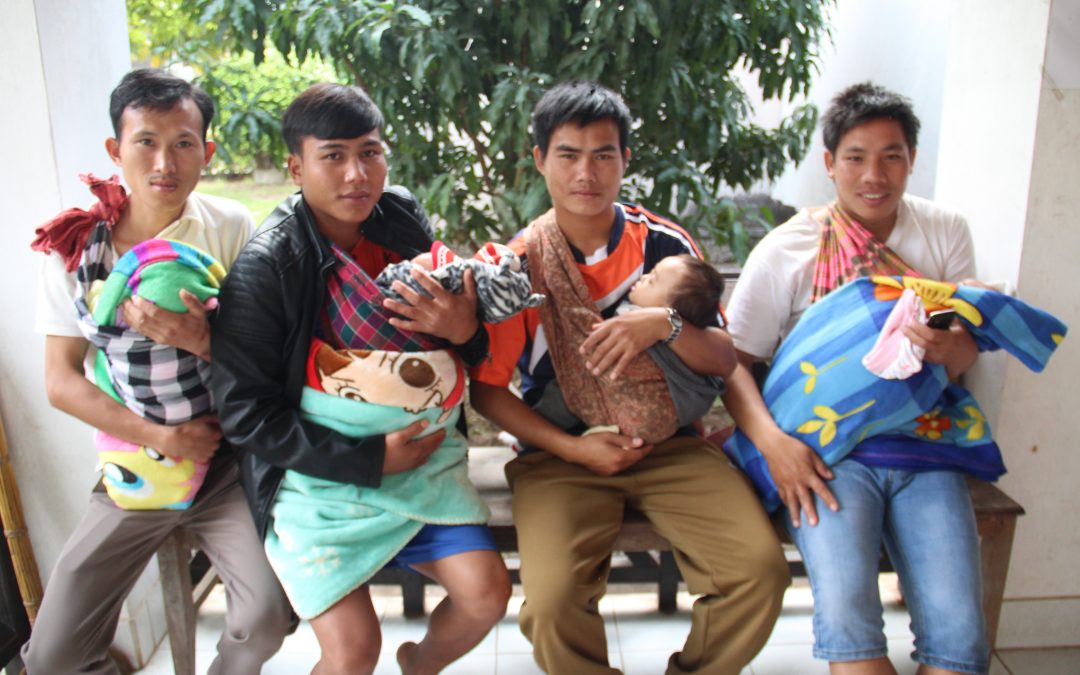Earlier this year, some midwife and childbirth educator friends and I presented a 5 day refresher training workshop to some 30 midwives and health workers in Laos. They were from villages within 2 of the poorest districts in Luang Prabang Province, where there are many ethnicities living in remote mountain areas. The photo above shows fathers caring for their babes while the mothers were inside attending the workshop. One couple and their baby had come 12 hours by motorbike to attend.
We hoped to uplift morale, build confidence and inspire creative thinking in using simple hands-on skills and various kinds of positioning to facilitate natural birth, prevent problems, negotiate obstructions and deal with complications – especially valuable where resources are limited and access to medical help sometimes impossible.
The foundation of our training was what we call ‘the 3 kindnesses’. We feel it’s not only a human and moral imperative in caring for mothers and babies, but a logical one too. Simple caring acts of kindness such as being helpful, asking about the mother’s needs and feelings, involving the family, and asking the mother’s permission for every intervention, were role played with every experiential exercise, whether a simple birth or a complicated one.
It was a delight and lots of fun and also deeply moving to spend time with these beautiful Laos women, and to remind them that they are not alone. All the experiences and feelings they have, we have experienced and felt too. Working with birth is a big responsibility, and can be amazing or lonely or scary or exhausting….
The 3 Kindnesses
- Be generous with sharing knowledge and information. As a care provider/health professional, you have a responsibility to keep learning, but it is a great kindness to also share information and knowledge with those in your care and with other members of the community when the opportunity arises. Birth knowledge is important knowledge for all people. It is a common mistake to consider yourself an expert with all the knowledge, and that those in your care don’t need to know about or understand the influences upon their wellbeing. Help people to help themselves. Help them to make healthy decisions for themselves and their children. When you educate and inform others, you lighten the load of your own responsibility, and increase the wellbeing and safety of individuals and communities.
- Show kindness to those you are caring for. Touch tenderly, speak kindly, listen well, and maintain a respectful attitude. Explain and seek permission for any interventions or procedures or techniques that may be required. Treat every woman as though she were your own sister, even if you realize you have some judgement and prejudices toward her. Giving birth is the most important job in the world. It is more important than your job and relies on the compassion of those attending to enable the mother to do it well and birth her baby with the least amount of stress and trauma possible. With the absence of kindness the mother can become tense and fearful. Through your kindness she can relax and feel secure. She will also be more trusting and honest about what she is experiencing. This enables a more effective labour. A body and mind free of tension and fear will birth more easily. Whatever happens in the birth, the mother will remember the kindnesses.
- Be kind to yourself. Caring for yourself enables you to do a better job of caring kindly for others. This means caring for your body, sharing your concerns and problems with others who will listen to you, and asking for help when you need it. Working with birth is an important and wonderful job, but it can sometimes be stressful and scary and exhausting. When you care for yourself, you become a positive role model for those around you and those you care for, and you appreciate the importance of kindness.
Jenny Blyth 2017

